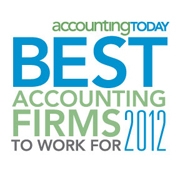News
21.09.2012
News, Personnel, Press

LMGW Certified Public Accountants, LLP (LMGW) was recently named as one of the 2012 Best Accounting Firms to Work for. This annual list was created by Accounting Today and Best Companies Group to identify, recognize and honor the best places of employment in the accounting industry. This is the fourth time that LMGW has been included in the annual list.
The Best Accounting Firms to Work for list is made up of a total of 100 companies, split into three groups: 47 small-sized companies (15-49 employees), 45 medium-sized companies (50-249 employees) and 8 large-sized companies (more than 250 employees). LMGW has been named one of the Best Accounting Firms to Work for in the small category.
Read more
17.08.2012
News
As we approach the end of the year, tax planning takes on an ever more significant tone in the months ahead. In particular 2012 is a challenging year to plan for due to the major uncertainty revolving around 2013 tax rates and rules. However, we feel the best course of action is to be prepared to “pull the trigger” on any plans by year end should it make sense from both an economic and tax point of view. To that end, in this article we will explore two of the major tax breaks for self-employed individuals or business owners that are currently set to expire at the end of this year.
Bonus Depreciation
Currently Congress has laws in place permitting us to deduct up to 50% of the cost of qualifying property with Code Section 168(k), also referred to as “Bonus Depreciaton”. This deduction is permitted for all fixed assets placed in service before December 31, 2012. Unlike Section 179 expense, which we will discuss next, there are no income, AGI or other limits on Bonus Depreciation. This deduction is available to all size businesses, for most assets that do not have other limitations in place (such as automobiles which have separate limitations) and can even be used to create a loss that can be carried back to prior tax years! Bonus Depreciation is available for AMT as well as regular tax and it can lead to significant write offs for large purchases. Accelerating planned 2013 fixed asset purchases into 2012 may create large tax breaks that will reduce your 2012 tax liability. As with any depreciation, it is important to note that Fixed Assets must be placed in service prior to December 31. Mere purchase, receipt or delivery of the asset does not qualify and the asset will not be able to be depreciated until it is placed in service. Unfortunately, California and many other states do not conform to Bonus Depreciation.
Section 179 Expense
Section 179 Expense has been a useful tool for many years for small business owners and self-employed individuals to expense the full amount of fixed asset purchases on qualifying assets. Section 179 has always had its limitations, namely a limitation on the amount of expense per year as well as a general limitation on the amount of fixed assets that can be placed in service during the tax year. For the past several years Congress has passed temporary increases in these limitations, thus making Section 179 a very effective tool to reduce tax liability. Unlike Bonus Depreciation, Section 179 cannot be used to create or increase a loss. Instead, any unused Section 179 expense will carry forward to the following tax year. Under current law, Section 179 expense limitations are set to reduce from the current generous amounts of $139,000 of current expense and a limitation on total assets placed in service of $699,000. With no changes in current law, these limitations are set to plummet to $25,000 of current expense on less than $200,000 of assets placed in service during the year. California never conformed to the increased Section 179 expense limitations; unless Congress acts, federal and California law will once again be in conformity starting January 1, 2013.
The Bottom Line
2013 law is currently uncertain but as a savvy business owner you should be prepared to “pull the trigger” on any fixed asset purchases before year end, as well as place these assets in service prior to year end. Fortunately, the decision on which types of depreciation or expense to take is one of the few “after the fact” decisions we can make when it comes to tax planning. However, the actual asset purchase is not. Being prepared is the key to maximizing tax efficiency, cash flow, and ultimately the success of your business. If you have any questions regarding Bonus Depreciation or Section 179 expense contact your LMGW advisor at once.
25.07.2012
Accounting, Business, Consulting, News
Hiring an independent contractor is often the simplest way for a business to get help in the door. However, the IRS, state labor and employment boards, unemployment insurance and worker’s compensation authorities all investigate whether or not employers are properly classifying workers. If any of these authorities determine that a worker that is being treated as an independent contractor should actually be an employee the remedies to correct the misclassification can be costly.
There are many benefits of classifying a worker as an independent contractor such as not providing the contractor with employee benefits, avoiding employer payroll tax liability, the ability to budget a specific amount for a project without paying overtime or holiday pay, savings in clerical costs and recordkeeping, less liability, and savings on workers compensation and unemployment insurance. While a hired independent contractor and employer may be in agreement in regards to their status, the IRS or other authority could disagree if they deem the relationship falls under the definition of employer-employee.
If the IRS or other authority determines that a worker classified as an independent contractor is actually an employee it can prove costly—the employer will be liable for past employer payroll taxes as well as penalties and interest and the burden of filing or amending all necessary payroll tax returns. If the issue is serious enough court time and costs or even criminal sanctions could result. Also, any retirement plans or other benefit plans that require certain compliance could be invalidated. Read more
20.07.2012
Accounting, Attest, Consulting, News
In 2009 a study was conducted to address how the accounting standards can meet the financial statement reporting needs of US private companies. The study found that accounting principles generally accepted in the United States of America (GAAP) often address issues that are not relevant to smaller, less complex companies, including those that are not public. Some of the most costly and complex standards to implement for a small business were the least relevant and least useful for the reader of the financial statements.
Many small private companies are normally only required to file income tax returns but lenders and bonding companies are requiring GAAP financials which the companies do not have the accounting resources to prepare. The cost of preparing the GAAP financials for these small private companies often exceeds the benefits.
The newly established Private Company Council will work directly with the Financial Accounting Standards Board (FASB) to give recommendations of various modifications to GAAP that would be considered beneficial for the small private company. During the first few years the council will meet several times during the year and will be open to the public. Stay tuned for updates on changes to the financial statement reporting standards for private companies as the Private Company Council implements its recommendations.
20.07.2012
News, Personnel
 LMGW Certified Public Accountants, LLP would like to congratulate Katie Vachon for not only passing all parts of the CPA exam, but also being promoted to Senior Accountant. Katie is submitting her application for her CPA license and awaiting official designation from the Board of Accountancy.
LMGW Certified Public Accountants, LLP would like to congratulate Katie Vachon for not only passing all parts of the CPA exam, but also being promoted to Senior Accountant. Katie is submitting her application for her CPA license and awaiting official designation from the Board of Accountancy.
Katie also has another exciting event coming up this month. She is getting married to her college sweetheart, Joe, in a ceremony that will be held in their home state of New Hampshire. Katie and Joe will enjoy a honeymoon taking in the sights of Europe. LMGW wishes Katie and Joe all the best as they begin their new life together.

